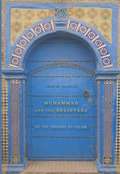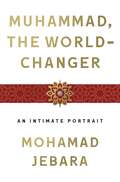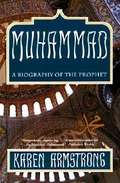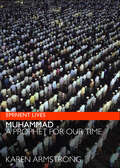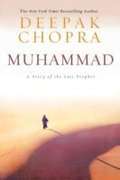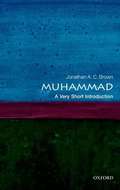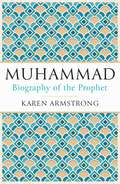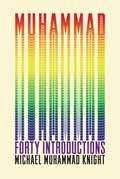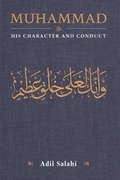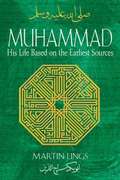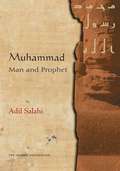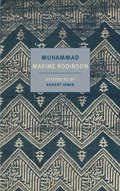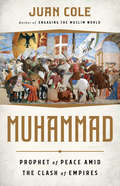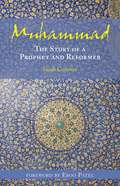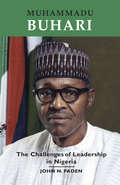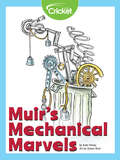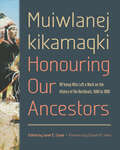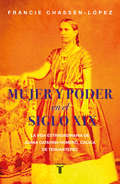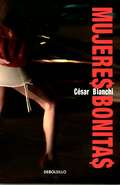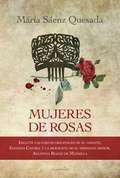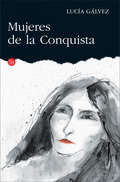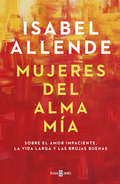- Table View
- List View
Muhammad and the Believers
by Fred M. DonnerThe origins of Islam have been the subject of increasing controversy in recent years. The traditional view, which presents Islam as a self-consciously distinct religion tied to the life and revelations of the prophet Muhammad in western Arabia, has since the 1970s been challenged by historians engaged in critical study of the Muslim sources. In Muhammad and the Believers, the eminent historian Fred Donner offers a lucid and original vision of how Islam first evolved. He argues that the origins of Islam lie in what we may call the "Believers' movement" begun by the prophet Muhammadâe"a movement of religious reform emphasizing strict monotheism and righteous behavior in conformity with God's revealed law. The Believers' movement thus included righteous Christians and Jews in its early years, because like the Qur'anic Believers, Christians and Jews were monotheists and agreed to live righteously in obedience to their revealed law. The conviction that Muslims constituted a separate religious community, utterly distinct from Christians and Jews, emerged a century later, when the leaders of the Believers' movement decided that only those who saw the Qur'an as the final revelation of the One God and Muhammad as the final prophet, qualified as Believers. This separated them decisively from monotheists who adhered to the Gospels or Torah.
Muhammad of Mecca: Prophet of Islam
by Elsa MarstonChildren's biography of the famous religious leader who changed his culture and the world.
Muhammad, the World-Changer: An Intimate Portrait
by Mohamad Jebara"An accessible biography of Muhammad, Islam’s founding prophet, tracing his development from orphan to political leader and providing insights into his personal life and tastes." —New York Times Book Review"A joyous read, presenting the Prophet Muhammad both as human and humane. Insightful, thoughtful and thought provoking! " —Azar Nafisi, New York Times bestselling author of Reading Lolita in Tehran“A beautifully written, immaculately researched meditation on the impact of the Prophet Muhammad on the modern world. I loved this book!” —Reza Aslan, author of No God but God and Zealot: The Life and Times of Jesus of NazarethA six-year-old cries in his mother’s arms as she draws her last breaths to urge him: “Muhammad, be a world-changer!” The boy, suddenly orphaned in a tribal society that fears any change, must overcome enormous obstacles to unleash his own potential and inspire others to do the same.Fusing details long known to Muslim scholars but inaccessible to popular audiences, Mohamad Jebara brings to life the gripping personal story of Islam’s founding prophet. From his dramatic birth to nearly being abducted into slavery to escaping assassination, Muhammad emerges as an unrelenting man on a mission. Surrounding the protagonist are dynamic women who nurture Muhammad; Jewish and Christian mentors who inspire him; and the enslaved individuals he helps liberate who propel his movement.Jebara places Muhammad’s life in a broader historical context, vividly evoking the Meccan society he was born into and arguing that his innovative vision helped shape our modern world.
Muhammad: A Biography of the Prophet
by Karen ArmstrongIn a meticulous quest for the historical Muhammad, Armstrong first traces the West's long history of hostility toward Islam, which it has stigmatized as a "religion of the sword." This sympathetic, engrossing biography portrays Muhammad (ca. 570-632) as a passionate, complex, fallible human being--a charismatic leader possessed of political as well as spiritual gifts, and a prophet whose monotheistic vision intuitively answered the deepest longings of his people. Armstrong (The Gospel According to Woman) refutes the Western image of Muhammad as an impostor who used religion as a means to power, an attitude encapsulated in a psychotic dream episode in Salman Rushdie's The Satanic Verses. Denying that Islam preaches total intransigence, she finds in the Prophet's teachings a theology of peace and tolerance. The "holy war" urged by the Koran, in Armstrong's reading, alludes to each Muslim's duty to fight for a just, decent society. She draws significant parallels between the spiritual aspirations of Judaism, Christianity and Islam.
Muhammad: A Prophet for Our Time (Eminent Lives)
by Karen ArmstrongNew York Times–Bestselling Author: This biography of the man who inspired the world’s fastest-growing religion “paints a portrait of a very human prophet” (The Wall Street Journal).Muhammad presents a fascinating portrait of the founder of a religion that continues to change the course of world history. Muhammad’s story is more relevant than ever, because it offers crucial insight into the true origins of an increasingly radicalized Islam. Countering those who dismiss Islam as fanatical and violent, Karen Armstrong, author of Islam and A History of God, offers a clear, accessible, and balanced portrait of the central figure of one of the world’s great religions.“A good glimpse of how the vast majority of the world’s Muslims understand their prophet.” —The New York Times“Respectful, knowledgeable, and, above all, readable. It succeeds because [Armstrong] brings Muhammad to life as a fully rounded human being.” —The Economist
Muhammad: A Story of the Last Prophet
by Deepak ChopraHistorical fiction story about the life of Muhammad. Born into the factious world of war-torn Arabia, Muhammad's life is a gripping and inspiring story of one man's tireless fight for unity and peace. In a world where greed and injustice ruled, Muhammad created change by affecting hearts and minds. Just as the story of Jesus embodies the message of Christianity, Muhammad's life reveals the core of Islam. Deepak Chopra shares the life of Muhammad as never before, putting his teachings in a new light. Following the historical record but offering a unique perspective, Chopra's Muhammad captures the historical prophet but more importantly shows us why his teachings are more important now than ever before.
Muhammad: A Very Short Introduction
by Jonathan A. C. BrownAs the founder of Islam, a religion with over one billion followers, Muhammad is beyond all doubt one of the most influential figures in world history. But learning about his life and understanding his importance has always proven difficult, as our only source of knowledge comes from the biography of him written by his followers, the reliability of which has been questioned by Western scholars. This Very Short Introduction provides a superb introduction to the major aspects of Muhammad's life and its importance, providing both Muslim and Western historical perspectives. It explains the prominent roles that Muhammad's persona has played in the Islamic world throughout history, from the medieval to the modern period. The book also sheds light on modern controversies such as the Satanic Verses, for which author Salman Rushdie was condemned for blasphemy, and the uproar over Danish cartoons of Muhammad, which triggered violent protests around the world. As these recent events show, whatever the truth about Muhammad's life, his persona still plays a crucial role in Muslim life and civilization. About the Series: Combining authority with wit, accessibility, and style, Very Short Introductions offer an introduction to some of life's most interesting topics. Written by experts for the newcomer, they demonstrate the finest contemporary thinking about the central problems and issues in hundreds of key topics, from philosophy to Freud, quantum theory to Islam.
Muhammad: Biography of the Prophet
by Karen ArmstrongA life of the prophet Muhammad by bestselling author Karen Armstrong.'Armstrong has a dazzling ability: she can take a long and complex subject and reduce it to its fundamentals, without over-simplifying' SUNDAY TIMES'One of our best living writers on religion' FINANCIAL TIMES'Not just a sympathetic book that would dispel the misconceptions and misgivings of its western readers, but also a book that is of considerable importance to Muslims' MUSLIM NEWSMost people in the West know very little about the prophet Muhammad. The acclaimed religious writer Karen Armstrong has written a biography which will give us a more accurate and profound understanding of Islam and the people who adhere to it so strongly. Muhammad also offers challenging comparisons with the two religions most closely related to it - Judaism and Christianity.
Muhammad: Biography of the Prophet
by Karen ArmstrongA life of the prophet Muhammad by bestselling author Karen Armstrong.'Armstrong has a dazzling ability: she can take a long and complex subject and reduce it to its fundamentals, without over-simplifying' SUNDAY TIMES'One of our best living writers on religion' FINANCIAL TIMES'Not just a sympathetic book that would dispel the misconceptions and misgivings of its western readers, but also a book that is of considerable importance to Muslims' MUSLIM NEWSMost people in the West know very little about the prophet Muhammad. The acclaimed religious writer Karen Armstrong has written a biography which will give us a more accurate and profound understanding of Islam and the people who adhere to it so strongly. Muhammad also offers challenging comparisons with the two religions most closely related to it - Judaism and Christianity.
Muhammad: Forty Introductions
by Michael Muhammad KnightMuhammad: Forty Introductions offers a distinct and nuanced take on the life and teachings of the prophet Muhammad, using a traditional genre of Islamic literature called the forty hadiths collection. Michael Muhammad Knight offers forty narrations that provide windows into the diverse ways in which Muslims envision Muhammad. He also examines his own relationship to Muslim traditions while exploring such topics as law, mysticism, sectarianism, gender, and sexuality. By revealing the Prophet to be an ongoing construction, he carefully unravels notions about Islam's center and margins.
Muhammad: His Character and Conduct
by Adil SalahiMuslims all over the world see Muhammad as God's last messenger to mankind. Through his actions, he showed the way to live a life that provides for all the needs of body, mind, and soul, and elevates man's aspirations towards a sublime ideal in a very simple, direct, and truthful manner. He built a state that was dedicated to truth and justice and to the liberation of man throughout the world. He wrote to emperors, kings, and rulers, calling on them to believe in God and to follow His message, yet, at the same time, he lived a life of poverty, leaving aside the riches that were offered to him.At a time when the Prophet is much maligned by writers, cartoonists, and various other detractors, this book aims to show Muhammad's true character in detail, both in its most everyday and most extraordinary moments.Adil Salahi's writings include the acclaimed Muhammad: Man and Prophet and Pioneers of Islamic Scholarship, and the English translation of the eighteen-volume In the Shade of the Qur'an. His main career has been in radio and print journalism, and for over thirty years he was editor of "Islam in Perspective," a twice-weekly full-page column in the Arab News, a Saudi daily newspaper.
Muhammad: His Life Based on the Earliest Sources
by Martin LingsA revised edition of the internationally acclaimed biography of the prophet - Includes important additions about the prophet's spread of Islam into Syria and its neighboring states - Contains original English translations from 8th and 9th century biographies, presented in authoritative language - Represents the final updates made on the text before the author's death in 2005 Martin Lings' biography of Muhammad is an internationally acclaimed, comprehensive, and authoritative account of the life of the prophet. Based on the sira, the eighth- and ninth-century Arabic biographies that recount numerous events in the prophet's life, it contains original English translations of many important passages that reveal the words of men and women who heard Muhammad speak and witnessed the events of his life. Scrupulous and exhaustive in its fidelity to its sources, Muhammad: His Life Based on the Earliest Sources is presented in a narrative style that is easily comprehensible, yet authentic and inspiring in its use of language, reflecting both the simplicity and grandeur of the story it tells. This revised edition includes new sections detailing the prophet's expanding influence and his spreading of the message of Islam into Syria and its neighboring states. It represents the final updates made to the text before the author's death in 2005. The book has been published in 12 languages and has received numerous awards, including acknowledgment as best biography of the prophet in English at the National Seerate Conference in Islamabad.
Muhammad: Man and Prophet
by Adil SalahiThe Prophet Muhammad initiated one of the most significant religious and cultural developments in human history, bringing the religion of Islam to the world. Adil Salahi's compelling biography traces the life of the Prophet Muhammad from his birth and childhood to the triumph of Islam and its hold on Arabia. The author sets this against a fascinating historical backdrop. His careful analysis of the Prophet's life is written with today's Muslim and non-Muslim readers in mind: Muslims will further their comprehension of their faith, and non-Muslims will come to understand the love Muslims have for their Prophet.
Muhammad: Prophet Of Islam
by Maxime RodinsonA classic secular history of the prophet Muhammad that vividly recreates the fascinating time in which Islam was born.Maxime Rodinson, both a maverick Marxist and a distinguished professor at the Sorbonne, first published his biography of Muhammad in 1960. The book, a classic in its field, has been widely read ever since. Rodinson, though deeply versed in scholarly studies of the Prophet, does not seek to add to it here but to introduce Muhammad, first of all, as &“a man of flesh and blood&” who led a life of extraordinary drama and shaped history as few others have. Equally, he seeks to lay out an understanding of Muhammad&’s legacy and Islam as what he called an ideological movement, similar to the universalist religions of Christianity and Buddhism as well as the secular movement of Marxism, but possessing a singular commitment to &“the deeply ingrained idea that Islam offers not only a path to salvation but (for many, above all) the ideal of a just society to be realized on earth.&” Rodinson&’s book begins by introducing the specific land and the larger world into which Muhammad was born and the development of his prophetic calling. It then follows the steps of his career and the way his leadership gave birth to a religion and a state. A final chapter considers the world as Islam has transformed it.
Muhammad: Prophet of Peace Amid the Clash of Empires
by Juan ColeIn the midst of the dramatic seventh-century war between two empires, Muhammad was a spiritual seeker in search of community and sanctuary. Many observers stereotype Islam and its scripture as inherently extreme or violent-a narrative that has overshadowed the truth of its roots. In this masterfully told account, preeminent Middle East expert Juan Cole takes us back to Islam's-and the Prophet Muhammad's-origin story. Cole shows how Muhammad came of age in an era of unparalleled violence. The eastern Roman Empire and the Sasanian Empire of Iran fought savagely throughout the Near East and Asia Minor. Muhammad's profound distress at the carnage of his times led him to envision an alternative movement, one firmly grounded in peace. The religion Muhammad founded, Islam, spread widely during his lifetime, relying on soft power instead of military might, and sought armistices even when militarily attacked. Cole sheds light on this forgotten history, reminding us that in the Qur'an, the legacy of that spiritual message endures. A vibrant history that brings to life the fascinating and complex world of the Prophet, Muhammad is the story of how peace is the rule and not the exception for one of the world's most practiced religions.
Muhammad: The Story of a Prophet and Reformer
by Sarah ConoverIn the pages of Muhammad: The Story of a Prophet and Reformer, young readers will encounter a man very different from the figure often presented in Western popular culture. Drawing from biographies, the Quran, and hadith, Sarah Conover, co-author of Ayat Jamilah: Beautiful Signs: A Treasury of Islamic Wisdom for Children and Parents, relates the story of a radical prophet who challenged the rich and powerful, guided his community of followers through a dangerous time of persecution and exile, formed alliances with people of different beliefs, and preached "love for humanity what you love for yourself. " Before he became one of the most venerated, and most misunderstood, religious leaders in history, Muhammad was an orphaned child and a shepherd. Written for readers 12 and up, and with a foreword by Eboo Patel (founder of Interfaith Youth Core and a member of the President's Council on Faith-Based Neighborhood Partnerships), Muhammad: The Story of a Prophet and Reformer will educate and inspire young adults and adults of all faiths.
Muhammadu Buhari
by John N. PadenThis authorized biography of the current president of Nigeria provides an up-close look at the life of a major ally of the West in the fight against terrorism, poverty, and corruption. The book covers Buhari’s early life and education, his military career, and his brief stint as military of state before he was deposed in a coup. A beacon for democracy in Africa, Buhari is the only Nigerian opposition candidate to be elected to the presidency. The book examines the first year of his presidency, looking at the immense security, economic, and political challenges he faces and the bold moves he is making to tackle them with support at home and abroad.
Muir's Mechanical Marvels
by Kate FalveyHave you ever heard of a bed that dumps you out if you try to hit snooze on your alarm clock? The “early rising machine” was one of John Muir’s many inventions. He loved to use his innovation and creativity to come up with new technology. If you could invent anything you want, what would you make?
Muiwlanej kikamaqki "Honouring Our Ancestors": Mi’kmaq Who Left a Mark on the History of the Northeast, 1680 to 1980 (Studies in Atlantic Canada History)
by Janet E. ChuteDrawing upon oral and documentary evidence, this volume explores the lives of noteworthy Mi’kmaw individuals whose thoughts, actions, and aspirations impacted the history of the Northeast but whose activities were too often relegated to the shadows of history. The book highlights Mi’kmaw leaders who played major roles in guiding the history of the region between 1680 and 1980. It sheds light on their community and emigration policies, organizational and negotiating skills, diplomatic endeavours, and stewardship of land and resources. Contributors to the volume range from seasoned scholars with years of research in the field to Mi’kmaw students whose interest in their history will prove inspirational. Offering important new insights, the book re-centres Indigenous nationhood to alter the way we understand the field itself. The book also provides a lengthy index so that information may be retrieved and used in future research. Muiwlanej kikamaqki – Honouring Our Ancestors will engage the interest of Indigenous and non-Indigenous readers alike, engender pride in Mi’kmaw leadership legacies, and encourage Mi’kmaw youth and others to probe more deeply into the history of the Northeast.
Mujer y poder en el siglo XIX: La vida extraordinaria de Juana Catarina Romero, cacica de Tehuantepec
by Francie Chassen-López«Juana Cata nunca se casó, así que fue libre, independiente y empresaria en una época en la que eso no era bien visto en una mujer.» Fuera de Oaxaca y, en particular, de su natal Tehuantepec, el nombre de Juana Catarina Romero es poco conocido. Si acaso detona alguna referencia, es como la supuesta "amante zapoteca" del joven Porfirio Díaz. Además de que este hecho nunca ha sido comprobado, se ha convertido en un mito que opaca una vida extraordinaria: la de una mujer de origen humilde, quien en su juventud fue vendedora ambulante de cigarrillos y espía del ejército liberal en la Guerra de Reforma, y quien, gracias a su tenacidad y habilidad política, llegó a ser una exitosa empresaria azucarera, una comerciante internacional y el árbitro de la sociedad tehuantepecana. Juana Cata tuvo una vida fuera de serie, entretejida con tres periodos cruciales de la historia de México: la ReformaLiberal, el porfirismo y la Revolución. Fue una mujer independiente que logró abrirse camino en un mundo dominado por los hombres, aunque su vida no estuvo exenta de contradicciones. Ella fue una impulsora de la modernidad, pero de una modernidad a la tehuantepecana, la cual unía el progreso, el catolicismo y las tradiciones zapotecas del istmo. El presente estudio es la biografía más completa de Juana Catarina Romero, sustentado en una investigación exhaustiva de muchos años. Al mismo tiempo que recrea la trayectoria de este sorprendente personaje -cómo una mujer humilde y analfabeta llegó a los altos rangos de la sociedad mexicana-, esta biografía proporciona una nueva perspectiva sobre la vida y el papel de las mujeres mexicanas en el siglo xix.
Mujeres Innovadoras
by Justin Sachs Alma Edith GarciaMujeres Innovadoras presenta a las principales emprendedoras y sus secretos del oficio. Va detrás de las cámaras dentro de las empresas dirigidas por mujeres y comparte los principios rectores, las herramientas y las estrategias que les ayudan para competir. Si usted está buscando iniciar un negocio o está buscando construir uno que ya ha iniciado, estas mujeres compartirán sus mejores consejos de cómo se puede tener éxito. El libro describe los pasos específicos que las mujeres pueden tomar para combinar el éxito empresarial con la realización personal e ilustra los beneficios de las mujeres en el ámbito laboral y en el hogar.
Mujeres bonitas
by Cesar BianchiCatorce testimonios que dan cuenta de la realidad y los sueños demujeres que tuvieron que ponerle precio a su cuerpo y al goce de sucompañía. "Con precisión y firmeza, César Bianchi recorre en catorce relatos todala gama de estados de ánimo en la vida de putas uruguayas. Aunque muydistintas entre sí, la escort VIP, la madre adolescente, la carperarural..., a todas las une el cordón umbilical de la pobreza y laexplotación.A veces como hijo, otras como voyeur e incluso como improbable cliente,el autor traza una serie de perfiles de auténtica prostitutas,recorriendo sus testimonios y mostrando los sueños y, más aún, larealidad de mujeres que tuvieron que ponerle un precio a su cuerpo y algoce de su compañía."
Mujeres de Rosas: Incluye las cartas originales de su amante, Eugenia Castro, y la biografía de su
by María Sáenz QuesadaLa madre, la esposa, la hija, la amante, la hermana y la amiga delRestaurador son, en este libro, objeto de una mirada nada convencional,irónica y apasionante. Ricas o pobres, luchadoras, ganadoras o sometidas, los personajes de losque habla este libro son un claro ejemplo de una parte hasta hace pocotiempo olvidada de nuestro pasado: el peso de las mujeres en la historiasocial del poder. Del carácter implacable y varonil de EncarnaciónEzcurra a la abnegación y dulzura de Manuelita Rosas, pasando por elencanto arrollador y la independencia de Agustinita, la hermana menordel dictador, la constelación de prototipos femeninos que rodeó a Rosaspermite reconstruir la enorme influencia que llegaron a tener lasmujeres de sociedad en la sofisticada vida porteña del siglo XIX.María Sáenz Quesada, con su pluma privilegiada, logró unrelato original, riguroso y pionero que se lee con el atractivo de unanovela. Su publicación y su notable repercusión han sido claves en lacomprensión del rol que jugaron desde siempre las mujeres en nuestropaís. Esta nueva edición aporta, además, materiales inéditos quecompletan un cuadro exquisito sobre la vida íntima y privada de lasgrandes personalidades de la historia argentina.
Mujeres de la Conquista
by Lucía GálvezLa historiadora rescata personalidades memorables e historias fascinantes del período de la conquista. La conquista y el poblamiento de nuestro territorio constituyen una epopeya que no siempre ha sido narrada con justeza. Menos aún, el papel relevante que las mujeres han cumplido en ella. Durante esos siglos, españolas, indias y mestizas ejercieron funciones múltiples, soportaron grandes sacrificios y muchas veces fueron silenciadas o padecieron penosas humillaciones. Con el rigor histórico y la solvencia narrativa que la caracterizan, Lucía Gálvez rescata algunas de las personalidades memorables de ese período y nos revela sus historias singulares y fascinantes.
Mujeres del alma mía: Sobre el amor impaciente, la vida larga y las brujas buenas
by Isabel AllendeUna Isabel Allende más Allende que nunca. Un regalo para todos sus lectores, una lección de vida y coraje. Cada año vivido y cada arruga cuentan mi historia. Isabel Allende bucea en su memoria y nos ofrece un emocionante libro sobre su relación con el feminismo y el hecho de ser mujer, al tiempo que reivindica que la vida adulta hay que vivirla, sentirla y gozarla con plena intensidad. En Mujeres del alma mía la gran autora chilena nos invita a acompañarla en este viaje personal y emocional donde repasa su vinculación con el feminismo desde la infancia hasta hoy. Recuerda a algunas mujeres imprescindibles en su vida, como sus añoradas Panchita, Paula o la agente Carmen Balcells; a escritoras relevantes como Virginia Woolf o Margaret Atwood; a jóvenes artistas que aglutinan la rebeldía de su generación o, entre otras muchas, a esas mujeres anónimas que han sufrido la violencia y que llenas de dignidad y coraje se levantan y avanzan... Ellas son las que tanto le inspiran y tanto le han acompañado a lo largo de su vida: sus mujeres del alma. Finalmente, reflexiona también sobre el movimiento #MeToo -que apoya y celebra-, sobre las recientes revueltas sociales en su país de origen y, cómo no, sobre la nueva situación que globalmente estamos viviendo con la pandemia. Todo ello sin perder esa inconfundible pasión por la vida y por insistir en que, más allá de la edad, siempre hay tiempo para el amor.
